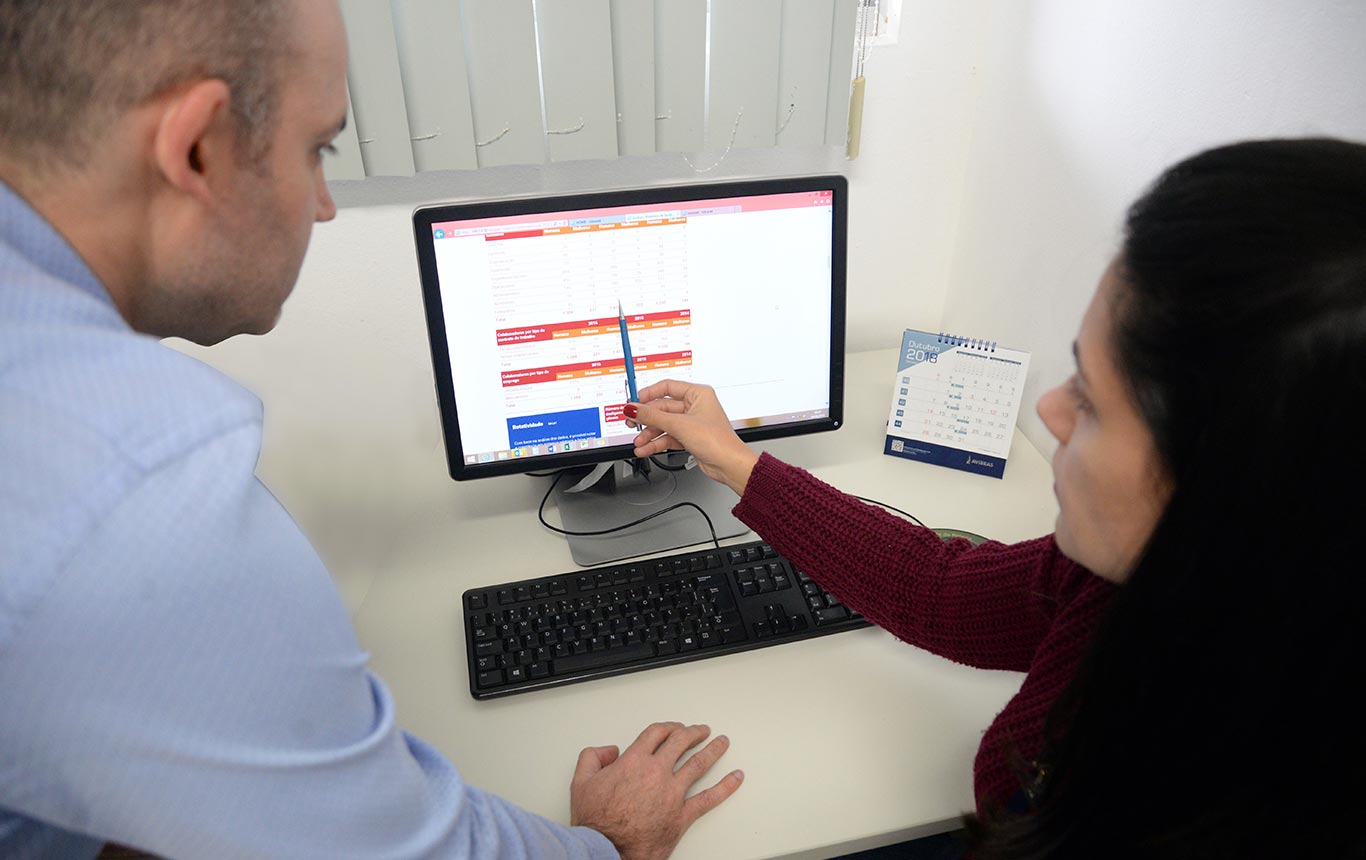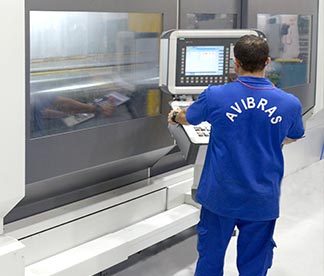We are intensely engaged in building the architecture for a new management and business excellence model
Since the company was founded, it has adopted a combination of processes, policies, standards, regulations and guidelines that constitute the Avibras Culture. All the business areas are expected to observe the principles of impartiality, transparency, ethical conduct, competitiveness and avoidance of conflicts of interest, focused on the company’s present and future needs in the economic, environmental and social dimensions.
In 2017, the company began structuring its Board of Directors, with implantation scheduled for 2020. The year also saw the creation of the Corporate Affairs area, as well as the Ethics Committee and the Audit and Risks Committee. Areas were merged to boost business efficiency and reinforce the governance model. The goal is to consolidate the company’s governance structure and revitalize, enhance and boost communication with all stakeholders: employees and families, shareholders, customers, local communities (in particular in the cities of São José dos Campos, Jacareí and Lorena in São Paulo state), business entities, the federal government, banks and development institutions, technical partners, universities/academia, suppliers, technology parks, industrial and innovation development agencies and trade associations.
The selection of these stakeholders was based on the target public map prepared by the Sustainability Committee, which consulted the diverse company areas that maintain external contacts and determined their importance for the company’s activities, forming what was considered to be a representative base. 102-40 | 102-42
The enhancements planned for the coming years include the creation by the Strategic Planning and Competitive Intelligence area of means of interacting with the Strategy and Competitive Intelligence Committee. Work is also underway on guaranteeing that the Leadership Development and Dedicated HR programmes provide support for the future People and Remuneration Committee.
Externally, Avibras is a member of industry associations in Brazil and overseas, including the Brazilian defence and security industry association ABIMDE, the national union of defence materials industries SIMDE, the Brazilian aerospace industries association AIAB, and the Association of the United States Army (AUSA). Avibras is intensifying its participation in these organizations, as well as joining others in the industry, with a focus on the region in which it operates and on the sectors in which the company intends to pursue technological development. 102-12 | 102-13
MANAGEMENT MECHANISMS 103-2 | 103-3
Organizational culture and business ethics converge and enrich corporate governance at Avibras, which has established management models to enhance the internal controls overseen by the Audit and Risk Committee and the Internal Audit area.
The company continuously updates its Code of Conduct, which sets forth the ethical standards and behaviour expected of all employees at work and in external relations, regardless of hierarchical level. The document formalizes the company’s commitment to conduct business with integrity and to observe the policies, procedures and practices that ensure a corruption-free business environment.
In line with best corporate governance practice, Avibras created an Ethics Channel in 2017. This is an exclusive channel through which employees, third-parties, suppliers, customers and the general public may report violations of the Code of Conduct or legislation. All reports are handled impartially and treated seriously, with the guarantee of confidentiality for the people involved. Reports may be made via the Internet (www.canaldeetica.com.br/avibras) or via toll-free telephone (0800.741.0001). The channel is global in scope, operating in Portuguese and English.
Avibras also maintains a process designed to assess and mitigate risks. This is essential to maintain awareness of company values and identify potential risks and vulnerabilities. Furthermore, it boosts knowledge of the entire value chain and extends the concern with integrity and transparency to partners, suppliers and other stakeholders. Avibras operates in strict compliance with labour laws and the guidelines of institutions that promote the principle of respect for human rights.


To drive quality relations based on trust with its employees, the company respects and promotes diversity, combating all forms of prejudice and discrimination by means of its Code of Conduct. With a focus on sustainability, the company conducts its business with integrity, backed by the adoption of anti-corruption policies, procedures and practices.
In the same vein, Avibras maintains open dialogue with public authorities at all levels. To ensure the promotion of transparency in business, the company continuously reviews practices and processes designed to consolidate knowledge and exchange experiences on aspects of governance, sustainability and anti-corruption policy, as well as other factors considered essential to ensure competitiveness.
GOVERNANCE STRUCTURE 102-18
Corporate governance at Avibras is ensured by entities such as the Consulting Council, the Audit and Risk Committee and supporting bodies that include an Ethics Committee and a Sustainability Committee. Other governance instruments are the company bylaws, internal regulations and business policies that provide guidelines designed to drive good corporate governance practices.
Statutory Board
João Brasil Carvalho Leite – Chief Executive Officer
Leandro Villar – Executive Vice President
Cynthia Benedetto – Executive Vice President
Executive Board
Almir Miguel Borges – Chief Operating Officer (COO)
Carlos Alberto Macedo Cidade – Corporate Affairs Director
Fábio Nakagawa – Industrial Director
Fernando Ranieri – Engineering Director
Marcelo Ramon Ferroni – Project Management Director
Consulting Council
João Brasil Carvalho Leite – Chairman
Jean Jacques Moacy Rochebois Campello – Member
Pedro Angelo Vial – Member
Marcelo Sayon Sáfadi – Member
Sustainability committee
Sustainability is considered to be key for Avibras, in conjunction with innovation, compliance and quality. The company believes that the way it does business and its conduct towards its different stakeholders are as important as financial results and product quality.
This is the reason that it has had a Sustainability Committee since 2016. The body adds value to its governance model by promoting best management practices and stimulating interaction with customers, government, suppliers, financial institutions, society, employees, partners and competitors.

The committee is charged with advising the board on the elaboration of sustainability strategies, which include the establishment of corporate guidelines and actions, mapping of indicators and reconciling economic development with social and environmental responsibility. The committee is sponsored by the CEO, who is directly involved in its activities and ensures the resources necessary for it to function effectively.
The company has been working continuously to ensure that environmental, social and economic questions focused on creating and distributing value are incorporated into business strategy and daily routines. This reinforces the company’s reputation in the market, driving financial value, inspiring greater confidence among strategic stakeholders, motivating the team, attracting talents, while enabling the company to measure and track its performance, improve its management systems, anticipate developments and identify and manage risks and opportunities, all this in an environment characterized by constant innovation.
The concept of sustainability is widely disseminated throughout the company via internal communication channels and the activities of the Sustainability Committee, the Ethics Committee and the Audit and Risk Committee. To ensure consolidation of this process, sustainability has been incorporated as an integral part of Avibras’ strategic planning and action plans.
RISK MANAGEMENT 102-11
Since 1982, the Avibras Culture has defined safety as a company priority. The Precautionary Principle has been central to this culture, not only in relation to the environment but also to the health and safety of employees and surrounding communities. The Health, Safety and Environment team is always involved in decisions concerning installations (building, demolition), processes, equipment, raw materials and waste through meetings with cross-functional teams, audits, inspections and requests for technical support from the most diverse areas. On these occasions decisions are taken on how to comply with legal requirements and the demands of regulatory agencies, as well as identifying opportunities to make the company safer and more sustainable.
Avibras has invested in areas and robust practices to drive greater transparency and trust.
The Audit and Risk Committee initiated its activities in 2017 aligned with best international market practices, enabling the constant evolution of corporate governance at Avibras. Worthy of note among the Committee’s activities are its tracking and evaluation of the internal control environment, independent audits, monitoring of corporate risks and oversight and elaboration of financial results.
The Audit and Risks Committee is also responsible for orientating managers regarding the development of effective processes, policies, procedures and internal controls to eliminate and reduce deviations, risks and losses for the company. When Avibras identifies risks, it acts on those considered to be priorities, focusing its efforts on factors that may affect company targets.
Risk management will continue to be refined in 2018. The company seeks to mitigate risk in an intelligent manner, reinforcing internal culture and participating in external events to stay abreast of best global practices and establish mechanisms which will make the business even more sustainable and competitive.
After a risk mapping exercise that involved over 40 carefully selected senior company executives, the main risks were classified and prioritized, enabling an accurate assessment of the company’s situation and priorities.
As good corporate governance practice, Avibras monitors corporate risks and others regarded as more important through its Audit and Risk Committee. The committee follows an annual agenda, consisting of a number of mandatory items, one of which is Risk Management.
The risk monitoring process is also overseen by the Board to ensure an adequate fit with company culture.
This is an essential practice that permits Avibras to identify and address questions that affect its business, enabling it to ensure more competitive positioning on the domestic and international scenes.
FOCUS ON CYBERSECURITY
In line with the company’s decision to create a dedicated area to address information security, Avibras also stepped up measures to reinforce cybersecurity. The cybersecurity area was established in mid-2017. It is manned by four specialists (recruited internally and externally) and reports directly to the office of the CEO. The cybersecurity area operates independently from the Information Technology area (IT), which constitutes an important differential.
This team’s initial diagnosis highlighted the efficiency of the company’s security system, with segregated data networks (Internet and corporate), USB port blocks, restricted use of equipment for recording images and other resources and procedures. The constant challenge is to achieve and maintain a balance, managing security-related technological, process and behavioural factors so as to mitigate potential risks without compromising business operations.
Although the situation within the company is under full control, the Information Security area is constantly on the watch for the emergence of new technologies that may prevent additional threats. This involves working in close partnership with the Business area, given that it is responsible for undertaking projects and providing support for new businesses.
Avibras’s risk matrix also reinforces this structure by including information security related incidents based on the pillars confidentiality, integrity and availability. To address these risks adequately, the company established a roadmap that takes into account processes, tools and awareness of existing projects, as well as those scheduled for the coming year. The selection of security tools encompasses solutions that use artificial intelligence technologies.
Risk identification, in particular at corporate level, is also the responsibility of the Internal Audit area, which operates in alignment with the Information Security team. The work includes monitoring websites and other practices, including those recommended within the scope of the ISO 27001 and ISO 27014 standards.


